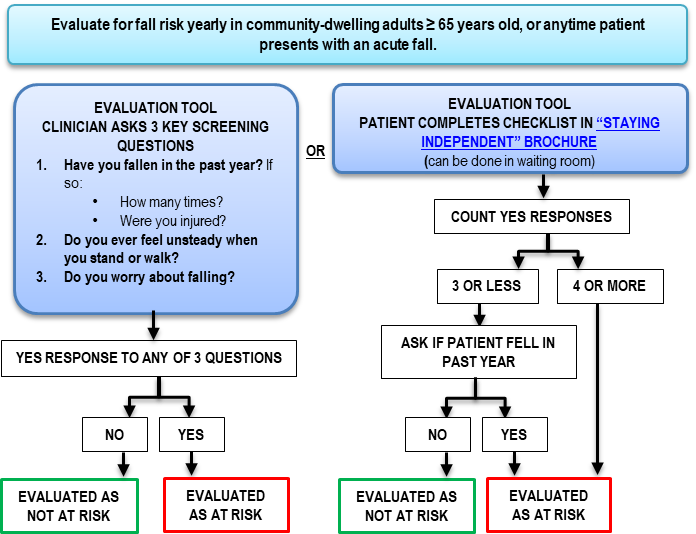How Dementia Fall Risk can Save You Time, Stress, and Money.
How Dementia Fall Risk can Save You Time, Stress, and Money.
Blog Article
The Best Guide To Dementia Fall Risk
Table of ContentsDementia Fall Risk Fundamentals ExplainedDementia Fall Risk Things To Know Before You BuyDementia Fall Risk for BeginnersThe Ultimate Guide To Dementia Fall RiskNot known Details About Dementia Fall Risk
Examining fall threat helps the whole health care group develop a much safer environment for every individual. Make sure that there is a marked location in your medical charting system where staff can document/reference ratings and document appropriate notes connected to fall prevention. The Johns Hopkins Autumn Danger Analysis Tool is one of many tools your staff can use to help stop negative clinical events.Patient drops in medical facilities are usual and devastating adverse events that continue in spite of decades of effort to lessen them. Improving interaction throughout the examining nurse, treatment group, person, and client's most involved loved ones may enhance autumn avoidance efforts. A team at Brigham and Female's Healthcare facility in Boston, Massachusetts, looked for to create a standard fall avoidance program that centered around boosted communication and patient and household involvement.

The technology group stressed that successful execution relies on patient and team buy-in, integration of the program right into existing operations, and integrity to program procedures. The team kept in mind that they are grappling with how to make certain continuity in program execution throughout durations of situation. During the COVID-19 pandemic, for instance, a boost in inpatient falls was connected with limitations in person involvement in addition to restrictions on visitation.
An Unbiased View of Dementia Fall Risk
These events are typically considered avoidable. To execute the intervention, companies need the following: Access to Autumn pointers sources Autumn pointers training and retraining for nursing and non-nursing staff, consisting of new registered nurses Nursing workflows that enable patient and household interaction to conduct the drops analysis, guarantee usage of the prevention strategy, and carry out patient-level audits.
The outcomes can be highly detrimental, often speeding up individual decrease and causing longer medical facility stays. One research approximated remains boosted an additional 12 in-patient days after an individual loss. The Loss TIPS Program is based upon appealing clients and their family/loved ones across 3 primary processes: assessment, individualized preventative interventions, and bookkeeping to make certain that people are participated in the three-step autumn prevention procedure.
The client analysis is based upon the Morse Loss Range, which is a validated autumn danger assessment tool for in-patient medical facility setups. The scale consists of the six most usual factors patients in hospitals drop: the client autumn background, high-risk conditions (consisting of polypharmacy), use IVs and various other exterior tools, psychological condition, gait, and flexibility.
Each threat aspect web links with one or even more actionable evidence-based Click Here treatments. The registered nurse creates a plan that integrates the interventions and shows up to the treatment group, client, and household on a laminated poster or published aesthetic help. Nurses develop the strategy while fulfilling with the person and the individual's family.
Dementia Fall Risk Fundamentals Explained
The poster functions as an interaction device with various other members of the patient's care team. Dementia Fall Risk. The audit part of the program includes evaluating the person's knowledge of their risk variables and prevention plan at the system and hospital degrees. Registered nurse champions carry out a minimum of five individual interviews a month with people and their family members to examine for understanding of the autumn avoidance plan

An approximated 30% of these drops cause injuries, which can range in seriousness. Unlike other unfavorable events that call for a standard clinical reaction, autumn avoidance depends extremely on the requirements of the person. Including the input of individuals that understand the client ideal permits higher personalization. This technique has actually confirmed to be much more efficient than autumn prevention programs that are based largely on the manufacturing of a danger score and/or are not customizable.
The Buzz on Dementia Fall Risk

Based upon bookkeeping results, one website had 86% compliance and 2 sites had over 95% conformity. A cost-benefit analysis of the Loss suggestions site here program in 8 medical facilities approximated that the program cost $0.88 per individual to apply and led to financial savings of $8,500 per 1000 patient-days in straight expenses associated with the prevention of 567 tips over 3 years and eight months.
According to the advancement team, companies thinking about implementing the program must conduct a preparedness assessment and drops avoidance voids analysis. 8 Furthermore, organizations should guarantee the essential framework and workflows for implementation and develop an implementation strategy. If one exists, the company's Fall Avoidance Task Force must be associated with preparation.
The Buzz on Dementia Fall Risk
To begin, companies ought to guarantee completion of training modules by nurses and nursing assistants - Dementia Fall Risk. Healthcare facility personnel need to evaluate, based on the requirements of a healthcare facility, whether to use an electronic health record printout or paper variation of the loss prevention plan. Executing teams must hire and educate nurse champions and establish processes for auditing and reporting on loss data
Personnel require to be included in the process of revamping the operations to engage patients and family in the assessment and prevention plan procedure. Equipment needs to be in location so that devices can recognize why an autumn took place and remediate the reason. Extra specifically, registered nurses ought to have channels to offer ongoing responses to both personnel and system management so they can change and improve loss prevention process and interact systemic issues.
Report this page